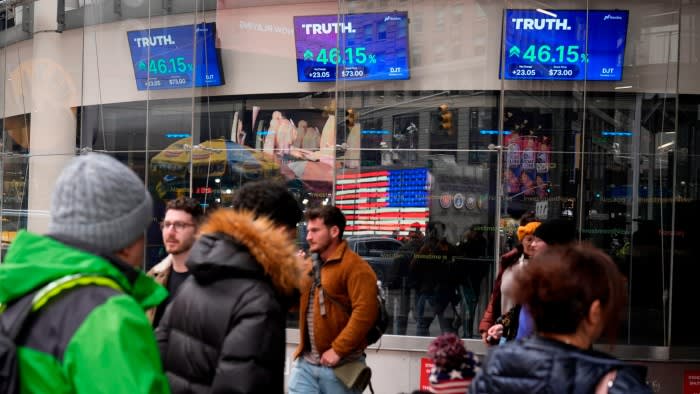Unlock the Editor’s Digest for free
Roula Khalaf, Editor of the FT, selects her favourite stories in this weekly newsletter.
Donald Trump endorsed the Bible this week. You might have thought that God’s presence was enough for believers at Easter, but the former US president has licensed his name, likeness and image to the “God Bless the USA Bible”, which sells for $59.99. “All Americans need a Bible in their home and I have many. It’s my favourite book,” he declared winsomely in a video on his Truth Social site.
The Bible pales in comparison with Truth Social itself as a wealth-generating venture linked to the Trump brand. He became $4.6bn richer on Tuesday, at least on paper, when his shares in its parent Trump Media & Technology Group rose sharply as it went public under the stock ticker DJT. “It’s hot as a pistol and doing great,” he said earlier. For once, he was not exaggerating.
The initial public offering and its sudden effect on Trump’s net worth is as improbable as a hero’s miraculous escape from peril in an action film, given the financial straits in which he finds himself. He faces an expensive presidential campaign, along with many legal cases, and must find $175mn to delay enforcement of a $464mn fraud judgment against him in New York’s courts.
So it is as well that Trump has single-mindedly devoted his adult life to burnishing the financial worth of his personal brand. In investment terms, the valuation of his social media company is ludicrous: a platform that lost $49mn on $3.4mn of revenues in the first nine months of last year is not worth billions. His salvation is that so many Trump fans do not think like that.
“Most will look back on today and think to themselves I should have TRIPLED my [holding] of #DJT stock when it was priced so very low,” one supporter wrote on Truth Social, adding a money bag emoji. The scepticism of Wall Street professionals about its intrinsic value has made little difference: buying the shares is an expression of faith in their political hero.
It feels rather like the meme stock craze of 2021, when small investors herded together to push up shares in GameStop and others. Gathering on the Reddit subforum WallStreetBets, they delighted in squeezing short sellers and boasting of their own resilience. A similar two-way struggle has broken out at TMTG, with the short sellers losing money so far.
This is not the end of the story. Many meme stocks have spiked similarly in a burst of fan-backed investing and fallen again, as have special-purpose acquisition companies (Spacs). TMTG became a publicly listed company after merging with a cash-rich Spac called Digital World Acquisition Corp, several of whose founders have taken legal action.
There is also a rich history of IPOs of companies with a digital gloss losing their early glamour, from theGlobe.com to Vonage. TMTG shows few signs of having sturdier foundations than those. Truth Social was launched as a free-speech platform after Trump was banned from Twitter, but its user base has shrunk since Twitter (now X) veered into similar territory under Elon Musk, who invited him back.
But all this may be beside the point. Many hardcore Trump fans are treating it less like an investment than a form of leveraged financial donation that they would not be too sad to lose. Since the former president owns 58 per cent of the shares, they can increase his net worth by a lot at relatively low personal cost: not for the first time, he has discovered a neat moneymaking device.
Their devotion will be tested in six months, when the lock-up on Trump’s shares will expire and he can cash in his billions (if they still exist) and become the biggest seller of all. He has form: the DJT ticker was once attached to his Atlantic City casinos and hotels business, which went into bankruptcy protection. “The money I took out of there was incredible,” he once said.
Even so, I imagine that plenty of those who keep the shares aloft until then would remain glad to have been of service. Given the level of conspiracy theorising on Truth Social about every event, from the war in Ukraine to this week’s Baltimore bridge disaster, Trump could blame forces beyond his control.
This would be the ultimate pay-off for being a global celebrity with a fan base. Indeed, the gulf between TMTG’s revenues and its valuation is a measure of his intangible brand value. Kim Kardashian’s Skims clothing company was valued at $4bn in July, but it was on track to have $750mn sales in 2023. Trump’s stake in TMTG would be worth less than $200mn on that basis.
No matter how improbable Trump’s new windfall, one cannot say it was an accident. Since he first turned up to the Studio 54 nightclub in the 1970s to hang out with New York celebrities, he has been a devoted student of personal brand management. He has attached his name to many products over the years, from casinos and magazines to vodka and now social media.
His newfound billions may yet evaporate, but for now they exist. Bernie Cornfeld, founder of a failed 1960s pyramid-selling empire, once pitched mutual funds under the slogan, “Do you sincerely want to be rich?” Trump is definitely sincere about that.

Emily Foster is a globe-trotting journalist based in the UK. Her articles offer readers a global perspective on international events, exploring complex geopolitical issues and providing a nuanced view of the world’s most pressing challenges.








